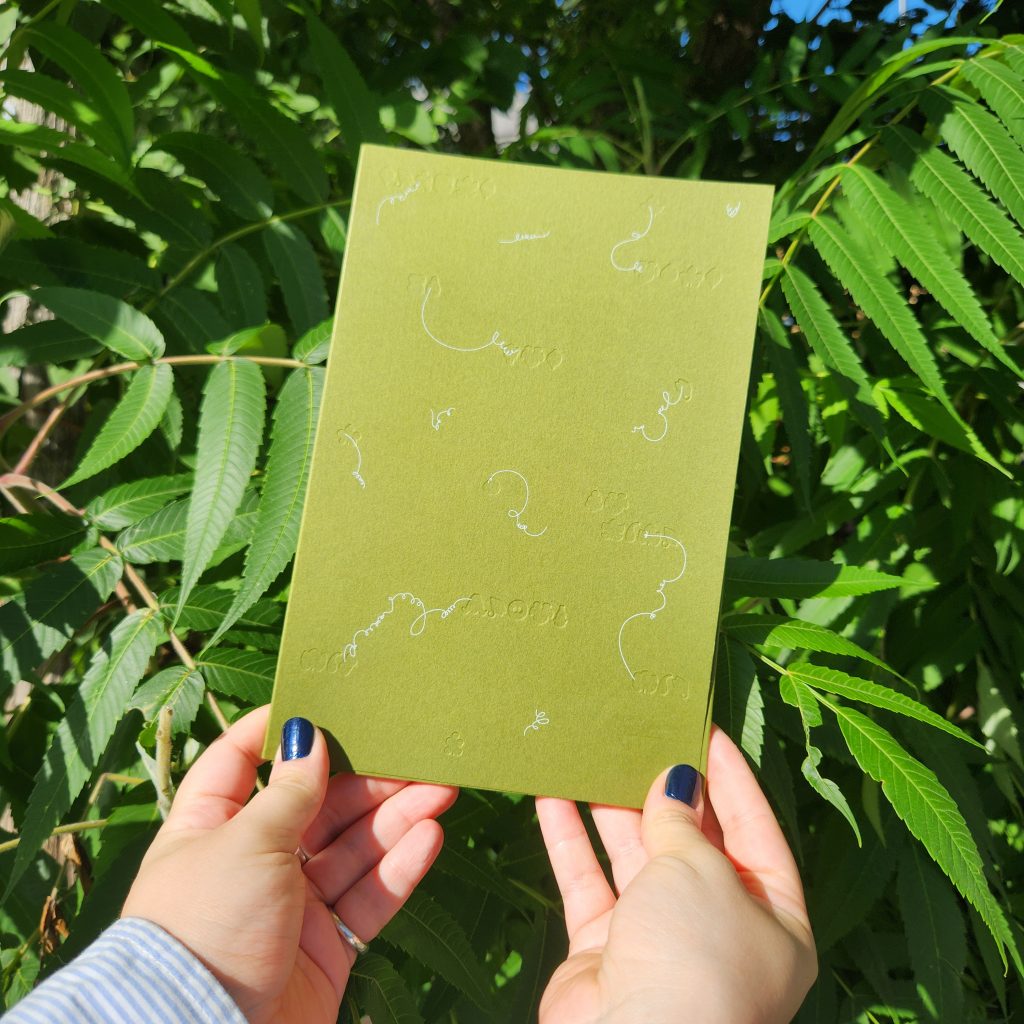Written by Ess Astifo.
I’m in the process of recovering from Canadian assimilation and my medicine is books. So the first thing I do when I find myself in the stacks is look for Arab literature. I’m always seeking out narratives that can speak to the disjointedness of my seven spice experience. My search results yielded this olive oil green artist book–Where Grape Leaves Grow written by Anna Daliza, and designed by Michelle Kuan and Emi Takahashi. The leaves of the cover fold up neatly like the dolma my mother would stuff and wrap methodically, one after the other, calling me over to help.

The text follows two speakers, one lettered in black ink and the other in blue. The former may be a family elder, a kin figure from the homeland, and the blue, a budding new leaf, the newest generation earthed on foreign land. The sparse yet deeply intimate opening exchange sets a funerary tone. Someone or someones have been lost and with them the origin story and cultural connection of our young blue speaker. Stamped between the dialogue of youth and elder are typewritten inscriptions of the chronology of Phoenecian to Lebanese Maronite, of whom Daliza’s family descend from. The pages grow into the telling of the origin story that our young speaker has been thirsting for.
I’m not Lebanese, like the writer Anna Daliza. I’m Assyrian-Iraqi, but Daliza’s family story is not far off from mine and I feel the same thirst. Both our families are of Christian ethnoreligious minorities, both ladled into the Arab soup, and both descendants of ancient civilizations. Our stories are that of loss and displacement. In fact, no move to Turtle Island is purely vibes-based. Your relation to this land is also one of displacement–either your own or someone else’s. Whether indigenous to this land and forced onto reservations or pushed out of your birthplace due to political turmoil, anthropogenic environmental disasters, or settler colonialism, your story likely involves movement for survival.
Where Grape Leaves Grow may be Anna Daliza’s debut book, but her writing is that of a practiced storyteller. The text’s historical account parallels, in story and structure, the past and present of her family story, their migration, and loss. As I write this, Lebanon is receiving its umpteenth military assault by a genocidal settler state; a state that prides itself on being a refuge to the exiled and which has consequently created millions of diasporians through its project of forced displacement. In addition to this text’s temporal performance, it explains both a local history and one mirrored by countless other regions and families. I too am a first generation child of Arab parents forced from another place where grape leaves grow, but this story still reads like my own. Daliza, in writing her own family and territorial history, writes many of ours. Like her, many of us did not have the privilege of being passed down our histories, oral or written. My parents left Iraq and their families behind with a few articles of clothing and a plastic bag of photos. In losing her family members, Daliza also loses access to their memories, cultural, and historical knowledge.
But in a move of self/lineage preservation, Daliza remedies this absence by birthing this book, her own self-published artifact; in crafting her own family mythology, she gifts many of us a blueprint of our own. Where familial memories are lost, we can turn to historical accounts and where archives fall short there are always the stories your elders have repeated a thousand times with untired verve while they sip tea on the sofa, belt unbuckled after a feast of upturned rice. This book is for those of us who live in the liminal space of neither here nor there and who are searching to uncover what was before in order to feel firmly rooted in who we are now. With the guidance of this intimate record, maybe I too will write my story.
